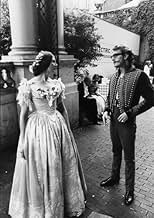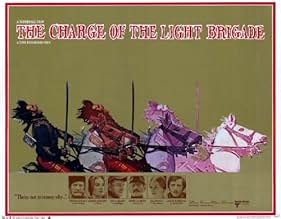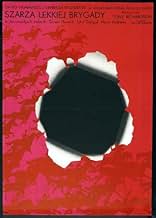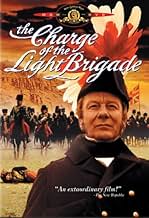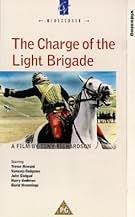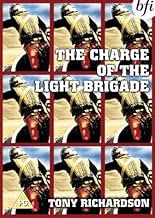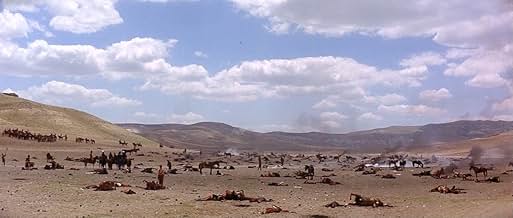VALUTAZIONE IMDb
6,6/10
4173
LA TUA VALUTAZIONE
Aggiungi una trama nella tua linguaIn 1854, during the Crimean War, poor planning leads to the British Light Brigade openly charging a Russian artillery position with tragic consequences.In 1854, during the Crimean War, poor planning leads to the British Light Brigade openly charging a Russian artillery position with tragic consequences.In 1854, during the Crimean War, poor planning leads to the British Light Brigade openly charging a Russian artillery position with tragic consequences.
- Regia
- Sceneggiatura
- Star
- Nominato ai 7 BAFTA Award
- 7 candidature totali
John J. Carney
- Trooper Mitchell
- (as John Carney)
Howard Marion-Crawford
- Lt. Gen. Sir George Brown
- (as Howard Marion Crawford)
Christopher Cunningham
- Farrier
- (as Chris Cunningham)
Recensioni in evidenza
I first saw THE CHARGE OF THE LIGHT BRIGADE in the late 1970s when it was broadcast on the Sunday night " Film Of The Week " slot . I liked it as a young child , then saw it several years later and wasn't quite taken with it mainly down to the fact that the first half is very slow and the second half is grim and depressing
After just seeing it again about ten minutes ago I still hold my second opinion . I will congratulate ( With reservations ) the production team for making a very British type of historical epic , this is far more accurate than say ZULU which was ironically directed and co-written by a Hollywood film maker for a Hollywood studio and in that film Cy Endfield showed that perhaps you have to rewrite history ever so slightly to make a classic epic movie based upon actual events . Unfortunately by being as accurate as possible as a history lesson THE CHARGE OF THE LIGHT BRIGADE resembles the critically panned ZULU DAWN rather than ZULU which is in many film critics top ten movies including mine
We learn that many British officers in the Victorian British army bought themselves their rank causing serious friction with officers who were totally professional soldiers who achieved their rank through talent . We learn how calvarymen train , we learn what goes on in the officers mess , we learn that the Crimean war was the first conflict to get major press coverage but all this does tend to hold the story up . It may run for just over two hours but the movie feels much longer .
A cast member ( I can't remember which one ) was interviewed several years ago and she mentioned the production team's eye for detail so much that many of the cast honestly thought they'd been transported back to the mid 19th century . She also mentioned packed crowds watching the film in cinemas on opening night but the crowds had totally disappeared within a couple of days . You can't help but feel the attention to historical detail had everything to do with the poor box office . I guess the audience were expecting something in the vein of ZULU
As I said I will congratulate the production team for their accuracy in fine detail but bewarned it is top heavy with social comment and if you have little interest in history you might want to watch the latest Hollywood blockbuster instead
After just seeing it again about ten minutes ago I still hold my second opinion . I will congratulate ( With reservations ) the production team for making a very British type of historical epic , this is far more accurate than say ZULU which was ironically directed and co-written by a Hollywood film maker for a Hollywood studio and in that film Cy Endfield showed that perhaps you have to rewrite history ever so slightly to make a classic epic movie based upon actual events . Unfortunately by being as accurate as possible as a history lesson THE CHARGE OF THE LIGHT BRIGADE resembles the critically panned ZULU DAWN rather than ZULU which is in many film critics top ten movies including mine
We learn that many British officers in the Victorian British army bought themselves their rank causing serious friction with officers who were totally professional soldiers who achieved their rank through talent . We learn how calvarymen train , we learn what goes on in the officers mess , we learn that the Crimean war was the first conflict to get major press coverage but all this does tend to hold the story up . It may run for just over two hours but the movie feels much longer .
A cast member ( I can't remember which one ) was interviewed several years ago and she mentioned the production team's eye for detail so much that many of the cast honestly thought they'd been transported back to the mid 19th century . She also mentioned packed crowds watching the film in cinemas on opening night but the crowds had totally disappeared within a couple of days . You can't help but feel the attention to historical detail had everything to do with the poor box office . I guess the audience were expecting something in the vein of ZULU
As I said I will congratulate the production team for their accuracy in fine detail but bewarned it is top heavy with social comment and if you have little interest in history you might want to watch the latest Hollywood blockbuster instead
We have to wait nearly two hours for the eponymous event which climaxes this film. Prior to this we see a series of apparently unconnected episodes which give the viewer an insight into the workings of Victorian society, including anti-intellectuallism and idleness among the 'upper' classes, and brutality and theft among the 'scum' recruited in the slums.
While almost plot less this section of the film does follow a core of characters whose lives are connected by army service. The main character is Captain Louis Nolan, an idealistic professional in an army of amateurs. "England is looking well" he says in the first scene of the film. The irony is that the country that looks so good is a cruel and mismanaged place. Unlike his fellow officers, who have bought their posts, he has worked his way up the ranks of the Indian Army by merit. He despises them and they feel he isn't a 'gentleman'.
Nolan has very definite views on how war should be fought. Faced with the reality of battle and the inadequacies of the commanders (the senile Raglan and the childish Lucan and Cardigan) his impatience and temper have tragic consequences as he impetuously points the Light Brigade ("There, my Lord, is your enemy, there are your guns!") towards the bloody fiasco of which he is the first victim. The man who seems to know best makes the biggest blunder of all. Eye-witnesses said the hideous scream Nolan gave when he was hit stayed with them all their lives and the film re-creates it in a truly chilling way.
Although the film does reflect 1960's attitudes to war and politics (and I actually prefer these to the attitudes of the 21st Century) its setting is so perfectly realized that it hasn't dated as a '60s film'. In fact it seems better with the passage of time. If you can free yourself from the idea of a narrative history and give yourself up to a series of impressions which add new layers of understanding 'Charge of the Light Brigade' makes a fine historical film.
While almost plot less this section of the film does follow a core of characters whose lives are connected by army service. The main character is Captain Louis Nolan, an idealistic professional in an army of amateurs. "England is looking well" he says in the first scene of the film. The irony is that the country that looks so good is a cruel and mismanaged place. Unlike his fellow officers, who have bought their posts, he has worked his way up the ranks of the Indian Army by merit. He despises them and they feel he isn't a 'gentleman'.
Nolan has very definite views on how war should be fought. Faced with the reality of battle and the inadequacies of the commanders (the senile Raglan and the childish Lucan and Cardigan) his impatience and temper have tragic consequences as he impetuously points the Light Brigade ("There, my Lord, is your enemy, there are your guns!") towards the bloody fiasco of which he is the first victim. The man who seems to know best makes the biggest blunder of all. Eye-witnesses said the hideous scream Nolan gave when he was hit stayed with them all their lives and the film re-creates it in a truly chilling way.
Although the film does reflect 1960's attitudes to war and politics (and I actually prefer these to the attitudes of the 21st Century) its setting is so perfectly realized that it hasn't dated as a '60s film'. In fact it seems better with the passage of time. If you can free yourself from the idea of a narrative history and give yourself up to a series of impressions which add new layers of understanding 'Charge of the Light Brigade' makes a fine historical film.
I do find it fascinating to come across obscure, almost forgotten films like this with familiar faces and famous actors in it. It was made ca. 1968, and in the true spirit of '68, it is strongly anti-war, anti-military, and anti-establishment, even though it is set in the Victorian era, the height of the Romantic age, when Military valor was largely celebrated. Military life is here portrayed in terms of ranks of men being bullied and brutalized by each successive rank above them, with the biggest, meanest and stupidest ones at the top.
I found it quite interesting to see the famous charge, celebrated in the romantic verses of Tennyson, portrayed in such a matter-of-fact manner as a series of tactical blunders due to bad communication and incompatible personalities among the commanders. These events were supposedly well-researched, and though I am not informed on the subject, I found this version of events very credible. Even with the high level of weapons and communications technology we have today, this sort of thing still happens. It must have been very common in centuries past.
To me, the dialog of this film and its delivery by the actors is its most remarkable feature. Seeing films that depict distant eras, I've often thought that these eras must have not just looked different from what we are used to, but sounded very different as well. If we were suddenly dropped into Victorian England, we wouldn't always understand what was being said or inferred to us. Words, phrases, gestures, facial expressions or body language that would have obvious meaning in that time and place would be strange to us. The language and syntax would, of course, be different, but so would the rhythm, pace, expressive color and accenting of the way people spoke. `Charge of the Light Brigade' does a remarkable job of not just looking, but sounding like a distant place and time. For a viewer who is not educated in antique British expressions and military jargon, as I am not, it makes watching this film a bit challenging, but it's like spending 130 minutes in the Victorian age as a so-called `fly-on-the-wall,' as the British put it. There was more than one line spoken after which I thought `say what?' But that's OK. It doesn't kill you, just encourages you to think a bit. This aspect of the film looks to be well-researched as well, a superb example of a somewhat talky script in which great care is taken with the language and its use by the actors. The script doesn't serve the purpose of an exposition device for the dumbest members of the audience, a very common vice in films, particularly big-money films engineered to alienate as few people as possible. It's an integral part of a design to recreate an unfamiliar time and place, and as such, a bit uncompromising.
I found it quite interesting to see the famous charge, celebrated in the romantic verses of Tennyson, portrayed in such a matter-of-fact manner as a series of tactical blunders due to bad communication and incompatible personalities among the commanders. These events were supposedly well-researched, and though I am not informed on the subject, I found this version of events very credible. Even with the high level of weapons and communications technology we have today, this sort of thing still happens. It must have been very common in centuries past.
To me, the dialog of this film and its delivery by the actors is its most remarkable feature. Seeing films that depict distant eras, I've often thought that these eras must have not just looked different from what we are used to, but sounded very different as well. If we were suddenly dropped into Victorian England, we wouldn't always understand what was being said or inferred to us. Words, phrases, gestures, facial expressions or body language that would have obvious meaning in that time and place would be strange to us. The language and syntax would, of course, be different, but so would the rhythm, pace, expressive color and accenting of the way people spoke. `Charge of the Light Brigade' does a remarkable job of not just looking, but sounding like a distant place and time. For a viewer who is not educated in antique British expressions and military jargon, as I am not, it makes watching this film a bit challenging, but it's like spending 130 minutes in the Victorian age as a so-called `fly-on-the-wall,' as the British put it. There was more than one line spoken after which I thought `say what?' But that's OK. It doesn't kill you, just encourages you to think a bit. This aspect of the film looks to be well-researched as well, a superb example of a somewhat talky script in which great care is taken with the language and its use by the actors. The script doesn't serve the purpose of an exposition device for the dumbest members of the audience, a very common vice in films, particularly big-money films engineered to alienate as few people as possible. It's an integral part of a design to recreate an unfamiliar time and place, and as such, a bit uncompromising.
Anyone who is looking for an historically accurate depiction of the charge of the Light Brigade at Balaklava, and the events that preceded it, had best leave this one on the video store shelf. Visually, the movie is well done and the cavalry action scenes are nearly as good as those portrayed in Sergei Bondarchuk's "Waterloo" - despite the fact that Bondarchuk had most of the Russian Army as extras. Unfortunately, director Tony Richardson couldn't make up his mind whether he was making a movie or a social commentary and his indecision pervades the story line from beginning to end. I notice that some other commentators here have praised the film for its accuracy. In reality it was anything but - most of the sub-plots were fabricated and some of the actual battle scenes are either gross distortions of what actually happened or improbable speculations. Captain William Morris (17th. Lancers), for example, was not foppish dilettante soldier portrayed - rather he was a tough, seasoned professional who had attended the Royal Military College, served in three previous campaigns and had taken part in the charge against the Sikh guns at Aliwal, India. Nor did he ride back wounded to the British lines after the charge as the movie would have it - in fact he was so badly wounded that he was left on the battlefield and was rescued much later by two of his comrades, both of whom received the Victoria Cross. And Captain Louis Nolan certainly didn't have an affair with Morris' wife (Vanessa Redgrave) as the plot implies - Nolan had never met Morris before they were both sent to the Crimea.
It was much in vogue to make iconoclastic war movies in the late '60s - "Oh! What a Lovely War", was another - probably because of Vietnam. It's a great pity that Richardson choose 'The Charge of the Light Brigade' as his protest vehicle since it leaves an enduring stain on the memory of 700 very gallant men. Yes, there were 700, not 600 - Tennyson got it wrong.
It was much in vogue to make iconoclastic war movies in the late '60s - "Oh! What a Lovely War", was another - probably because of Vietnam. It's a great pity that Richardson choose 'The Charge of the Light Brigade' as his protest vehicle since it leaves an enduring stain on the memory of 700 very gallant men. Yes, there were 700, not 600 - Tennyson got it wrong.
First, it should be noted that Tony Richardson's "The Charge of the Light Brigade (1968) is not a remake of the Errol Flynn classic adventure film of 1936; rather it is based on the Cecil Woodham-Smith work of military history, "The Reason Why". Both book and film are a debunking of the Tennyson poem. And hard as it is to believe, Richardson's film actually tones down the absurdities of the three principle figures responsible for the debacle at Balaclava. And these three stooges thoroughly deserve the censure of history, for never were the lives of six hundred brave men thrown away more senselessly than with the charge of the Light Brigade.
Richardson depicts the insanity of the Crimean War and Victorian society's glorification of militarism with a death's head sense of humor which makes the horrors of the conflict all the more potent. And he is unsparing in his condemnation of the culture that could glorify so unmitigated a disaster as Balaclava. The film was made at the height of America's involvement in the Vietnam War and it is an implicit critique of that conflict and war in general in that all countries regardless of time and place indulge in the pastime of National Lying. The greater the calamity, the greater the need to lie or glorify, for always the dead must count for something. In that sense the film is universal as well as timeless.
Using animation in the style of the Victorian newspaper caricaturists, during the opening credits, the film quickly details the events that led up to the war. This is also one of the few films to hold the media, in this case the English newspapers of the time, accountable for their actions. Instead of calling for deliberations and a halt to the madness that must inevitably lead to war, the press is shown whipping the British nation into war frenzy. These animated sequences which appear throughout the film to forward the exposition are both wonderfully inventive and wickedly delicious.
Throughout the film which is satiric and misanthropic in tone, the lower classes are shown to be stupid, ugly, and easily led, while the upper classes are shown to be stupid, beautiful, and utterly incapable of leading. Indeed the only decent individuals portrayed are either destroyed or trampled under foot by events and/or the arrogant stupidity of their superiors. Yet Richardson is never judgmental; rather he takes a Kubrickian detached point of view, allowing the viewers to observe the era and its foibles/morals and judge for themselves. And England of the mid-nineteenth century is beautifully recreated here. Hairstyles and uniforms and sets are rendered in exquisite detail. It takes its rightful place along side "Barry Lyndon" and "The Duelists" as among the most successful period recreations.
The film also uses a lot of period colloquialisms such as, "My cherry-bums!" and "All this swish-n-tits has made me randified!" and "You tell that stew-stick of a brother-in-law, that Brudenell to fetch off!" Wonderful, though some first time viewers may have difficulty understanding exactly what has just been expressed. And what a cast! Trevor Howard, Harry Andrews and especially John Gielgud give career topping performances. Gielgud as Lord Raglan, the slightly befuddled commander-in-chief, steals every scene he is in. Aging, tired in mind and body, missing one arm, continuously mistaking the French, ("Our allies, My Lord...") for the enemy, never quite grasping the situation whether in his office or on the field of battle, ("England is pretty, babies are pretty, some table linen is very pretty!") Its a delightful comic turn. And who wouldn't feel sorry for anyone unfortunate enough to be caught between Trevor Howard as the choleric Lord Cardigan, ("The melancholy truth was that his golden head had nothing in it.") and Harry Andrews as the equally bilious Lord Lucan? From the moment we see his saturnine countenance striding up the marble steps of the War Office we know this is a humorless, flint-hearted martinet. Both Lords had a long running personal feud which they quickly placed on an official level as well with unfortunate consequences for the Light Brigade.
David Hemmings and Vanessa Redgrave are the young romantic leads. Hemmings is Captain Lewis Nolan, a forward thinking career officer with very definite ideas how war should be conducted. He has returned to England after service in India to join Cardigan's regiment, and quickly runs afoul of the Lord in the affair of the "Black Bottle". In reality it involved another officer, who Cardigan placed under arrest for serving porter, (it was actually Moselle) when he had given strict orders that only champagne be served at the mess. Nolan the professional is unstinting in his criticisms or the three amateur Lords conduct of the war, and yet he too will play an unwitting part in the final destruction of the Brigade. A man of honor, whose honor however does not prelude having an affair with his best friends wife. Redgrave as the wife is as always, luminescent. The supporting cast sparkles as well. Mark Dignam as General Airey, Raglan's Chief of Staff, ("Speak up Nolan, he's a bit hard of hearing, and that statue doesn't help!") Howard Marion-Crawford as Lt. General Sir George Brown, Peter Bowles as Captain Henry Duberly, Norman Rossington as Sergeant Major Corbett, ("Right foot, straw foot!") and especially Jill Bennett as a lascivious Fanny Duberly all are very effective. This was also one of the last appearances of the great English classical actor, Sir Donald Wolfit, who would die later that year.
Finally enough cannot be said of Charles Wood's wonderful screenplay. With its exquisite use of the period vernacular it does a superb job of combining characters while paring history down to the essential to reconstruct the chain of events that led up to the destruction of the Light Brigade.
Richardson depicts the insanity of the Crimean War and Victorian society's glorification of militarism with a death's head sense of humor which makes the horrors of the conflict all the more potent. And he is unsparing in his condemnation of the culture that could glorify so unmitigated a disaster as Balaclava. The film was made at the height of America's involvement in the Vietnam War and it is an implicit critique of that conflict and war in general in that all countries regardless of time and place indulge in the pastime of National Lying. The greater the calamity, the greater the need to lie or glorify, for always the dead must count for something. In that sense the film is universal as well as timeless.
Using animation in the style of the Victorian newspaper caricaturists, during the opening credits, the film quickly details the events that led up to the war. This is also one of the few films to hold the media, in this case the English newspapers of the time, accountable for their actions. Instead of calling for deliberations and a halt to the madness that must inevitably lead to war, the press is shown whipping the British nation into war frenzy. These animated sequences which appear throughout the film to forward the exposition are both wonderfully inventive and wickedly delicious.
Throughout the film which is satiric and misanthropic in tone, the lower classes are shown to be stupid, ugly, and easily led, while the upper classes are shown to be stupid, beautiful, and utterly incapable of leading. Indeed the only decent individuals portrayed are either destroyed or trampled under foot by events and/or the arrogant stupidity of their superiors. Yet Richardson is never judgmental; rather he takes a Kubrickian detached point of view, allowing the viewers to observe the era and its foibles/morals and judge for themselves. And England of the mid-nineteenth century is beautifully recreated here. Hairstyles and uniforms and sets are rendered in exquisite detail. It takes its rightful place along side "Barry Lyndon" and "The Duelists" as among the most successful period recreations.
The film also uses a lot of period colloquialisms such as, "My cherry-bums!" and "All this swish-n-tits has made me randified!" and "You tell that stew-stick of a brother-in-law, that Brudenell to fetch off!" Wonderful, though some first time viewers may have difficulty understanding exactly what has just been expressed. And what a cast! Trevor Howard, Harry Andrews and especially John Gielgud give career topping performances. Gielgud as Lord Raglan, the slightly befuddled commander-in-chief, steals every scene he is in. Aging, tired in mind and body, missing one arm, continuously mistaking the French, ("Our allies, My Lord...") for the enemy, never quite grasping the situation whether in his office or on the field of battle, ("England is pretty, babies are pretty, some table linen is very pretty!") Its a delightful comic turn. And who wouldn't feel sorry for anyone unfortunate enough to be caught between Trevor Howard as the choleric Lord Cardigan, ("The melancholy truth was that his golden head had nothing in it.") and Harry Andrews as the equally bilious Lord Lucan? From the moment we see his saturnine countenance striding up the marble steps of the War Office we know this is a humorless, flint-hearted martinet. Both Lords had a long running personal feud which they quickly placed on an official level as well with unfortunate consequences for the Light Brigade.
David Hemmings and Vanessa Redgrave are the young romantic leads. Hemmings is Captain Lewis Nolan, a forward thinking career officer with very definite ideas how war should be conducted. He has returned to England after service in India to join Cardigan's regiment, and quickly runs afoul of the Lord in the affair of the "Black Bottle". In reality it involved another officer, who Cardigan placed under arrest for serving porter, (it was actually Moselle) when he had given strict orders that only champagne be served at the mess. Nolan the professional is unstinting in his criticisms or the three amateur Lords conduct of the war, and yet he too will play an unwitting part in the final destruction of the Brigade. A man of honor, whose honor however does not prelude having an affair with his best friends wife. Redgrave as the wife is as always, luminescent. The supporting cast sparkles as well. Mark Dignam as General Airey, Raglan's Chief of Staff, ("Speak up Nolan, he's a bit hard of hearing, and that statue doesn't help!") Howard Marion-Crawford as Lt. General Sir George Brown, Peter Bowles as Captain Henry Duberly, Norman Rossington as Sergeant Major Corbett, ("Right foot, straw foot!") and especially Jill Bennett as a lascivious Fanny Duberly all are very effective. This was also one of the last appearances of the great English classical actor, Sir Donald Wolfit, who would die later that year.
Finally enough cannot be said of Charles Wood's wonderful screenplay. With its exquisite use of the period vernacular it does a superb job of combining characters while paring history down to the essential to reconstruct the chain of events that led up to the destruction of the Light Brigade.
Lo sapevi?
- QuizFilming was immensely problematic. Director Tony Richardson fired a stunt coordinator whose manic swordplay killed several horses. An earthquake destroyed the hotel used by the production. David Hemmings was extremely temperamental on-set. The crew and extras, many of whom were Turkish soldiers, fought verbally and physically with local villagers who resented their incursion into the area. Richardson's strange mixture of perfectionism and historical flippancy grated on both his crew and advisers. While filming the final battle, the soldiers were called away for a NATO war exercise, forcing Richardson to shoot the scene with only a few dozen stuntmen.
- BlooperThe character called Featherstonehaugh (played by Corin Redgrave) has his name pronounced more or less as it is written, with four syllables. An upper-class Englishman of the mid-19th century (or, indeed, today) would pronounce it "Fanshawe".
- Citazioni
Lord Raglan: It will be a sad day for England when her armies are officered by men who know too well what they are doing - it smacks of murder.
- Curiosità sui creditiIn the animation over the opening credits, the English lion roars just as "A Woodfall Film" appears onscreen (mimicking Leo the Lion at the start of Metro-Goldwyn-Mayer movies).
- Versioni alternativeAlthough the cinema version was complete the 1993 UK video release was cut by 7 secs to edit footage of horse-falls. The 2008 Optimum DVD has the cuts length extended to 14 secs and features the 6 minutes shorter print as mentioned below.
- ConnessioniFeatured in L'incredibile affare Kopcenko (1969)
- Colonne sonoreThe Girl I Left Behind Me
(uncredited)
Traditional
Arranged by Trevor L. Sharpe
Heard before the Battle of the Alma
I più visti
Accedi per valutare e creare un elenco di titoli salvati per ottenere consigli personalizzati
- How long is The Charge of the Light Brigade?Powered by Alexa
Dettagli
- Data di uscita
- Paese di origine
- Lingue
- Celebre anche come
- La carga de la brigada ligera
- Luoghi delle riprese
- Pecenek, Turchia(charge in the Valley of Death)
- Azienda produttrice
- Vedi altri crediti dell’azienda su IMDbPro
Botteghino
- Budget
- 8.000.000 USD (previsto)
- Tempo di esecuzione
- 2h 19min(139 min)
- Colore
- Mix di suoni
- Proporzioni
- 2.35 : 1
Contribuisci a questa pagina
Suggerisci una modifica o aggiungi i contenuti mancanti


